Our cruise around the Greek Peloponnese provided us with the chance to visit a variety of archeological sites with some being relatively intact.
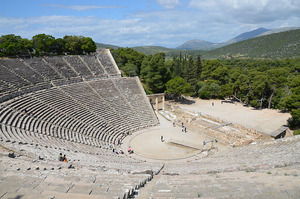 In the 15,000-seat amphitheatre at Epidaurus, we sat at the top tier on cold, stone seats, amazed by the acoustics which allowed us to hear a coin dropped in the centre of the circular stage.
In the 15,000-seat amphitheatre at Epidaurus, we sat at the top tier on cold, stone seats, amazed by the acoustics which allowed us to hear a coin dropped in the centre of the circular stage.
Monemvasia, known as the Gibraltar of Greece, was a stunning protected town with only one entrance and 40 churches. We didn’t have to worry about dodging cars or bikes which aren’t allowed, but the narrow, cobbled alleys with numerous steps and slippery stones meant keeping our eyes to the ground. The main street was lined with small bars and shops selling a range of souvenirs including olive wood kitchen ware, honey and oils.
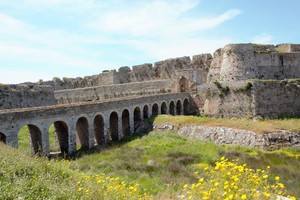 The 1300 AD Methoni Castle, one of the most beautiful in the Venetian period, was still spectacular, being surrounded by the coast on three sides and a moat on the landside. The weather was sunny and warm and this was one place we could easily have spent more time (especially with a picnic and bottle of wine).
The 1300 AD Methoni Castle, one of the most beautiful in the Venetian period, was still spectacular, being surrounded by the coast on three sides and a moat on the landside. The weather was sunny and warm and this was one place we could easily have spent more time (especially with a picnic and bottle of wine).
After a journey through barren, rock-covered mountains (said to be akin to Scotland) we found Areopoli, a traditional Mani village noted for its square, stone-built tower houses. We visited both of the 18th century churches: one with 1,000 year old frescos on the walls, partly destroyed by the Romans, and the other with the highest bell tower in Mani. Cafes and restaurants, with coloured and unique seating outside, were in abundance and one had octopus pegged out to dry on a washing line – stray cats sat hopefully underneath it, licking their lips.
Other sites visited, required more imagination to visualize how the buildings would have looked in ancient times.
Mycenae was a major centre of the Greek civilization and having walked through the Lions Gate, Jenny, our guide, told us of the hidden treasures discovered only 200 years ago and walls that only the fabled Cyclops could have built. After a long, uphill hike, past piles of stones, we found the former site of the Palace and a ‘spring’ but all we saw was a pool of green, slimy water. The nearby Tomb of Agamemnon, the king who won the Trojan war, was a bee hive dome with a huge lintel across the entrance weighing 120 tonnes (equivalent to 10 routemaster buses) – it’s still a mystery as to how it got there.
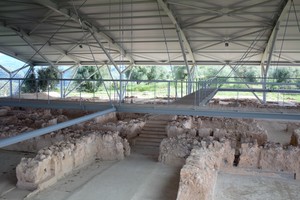 Until recently, we’d have been able to walk over the ruins of Nestor’s Palace, dating back to 1300 BC but they’re now covered by a raised wooden walkway and an impressive curved steel roof.
Until recently, we’d have been able to walk over the ruins of Nestor’s Palace, dating back to 1300 BC but they’re now covered by a raised wooden walkway and an impressive curved steel roof.
The palace was formerly discovered in 1939 with the German’s undertaking unofficial explorations during the war. In 1952, hundreds of clay tablets, bearing scripts, were found along with 1000s of cups and storage jars, some of which have are still firmly rooted in the ground.
Two of the more well-known sites on our itinerary were Olympia and Delphi. Both had relatively small museums but they were well laid out and light and bright with original artefacts, all found on the sites. Jenny took us around the most important pieces before allowing us wander at leisure.
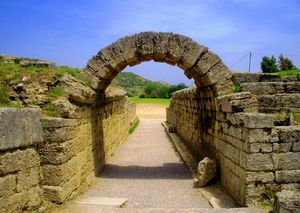 At Olympia, we learned that the first games, held in 776 BC, allowed only free, male Greeks to participate and only men, and the High Priestess Hera, could watch the games possibly because the competitors were naked (the word gymnasium comes from a Greek noun meaning ‘place to be naked or exercise’). The Olympics were outlawed in 393 AD by the Christians who objected to the nudity.
At Olympia, we learned that the first games, held in 776 BC, allowed only free, male Greeks to participate and only men, and the High Priestess Hera, could watch the games possibly because the competitors were naked (the word gymnasium comes from a Greek noun meaning ‘place to be naked or exercise’). The Olympics were outlawed in 393 AD by the Christians who objected to the nudity.
We passed the gymnasium, Temples of Zeus and Hera and the alter where animals were sacrificed and the Olympic flame lit – it wasn’t until 1936 that the Olympic flame first left Greece, for the Berlin Olympics. A path, leading to the Olympic stadium, was lined with columns which had been engraved with the names of athletic cheats as a salutary lesson: nothing is new. The group’s younger members ran the length of the famous rectangular track, chased by enthusiastic stray dogs.
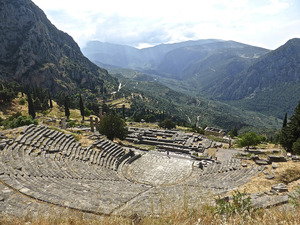 Delphi, excavated by the French from 1894, is known for its Oracle, the priestess Pythia, who provided advice having gone into a trance from noxious gases. Climbing up to the main site high on a hill, we had views of entire area and coast, and passed ruins of treasuries where trophies from wars were kept and an amphitheatre, but we didn’t have the energy to continue further up to the stadium.
Delphi, excavated by the French from 1894, is known for its Oracle, the priestess Pythia, who provided advice having gone into a trance from noxious gases. Climbing up to the main site high on a hill, we had views of entire area and coast, and passed ruins of treasuries where trophies from wars were kept and an amphitheatre, but we didn’t have the energy to continue further up to the stadium.
As a change to ruins, rocks and churches, we visited the Diros Caves 200m below sea level. They were only discovered in 1949 and today, they’re still discovering new channels. 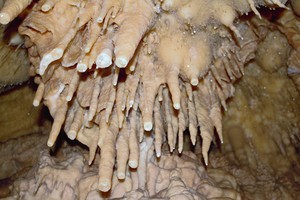 We learned about the four colours of stalagmites and stalactites and the cause, with the green being created by electric light bulbs which have now been replaced by LED. A small boat took us through the stalagmites/tites which take 100 years to create 1cm and then having negotiated a low, short tunnel, we walked along a section to admire the various colours, formations, shapes and sizes. Back on the coach we discussed how we remembered the difference between the mites and tites: I was taught, ‘the mites go up the legs and the tights come down’!
We learned about the four colours of stalagmites and stalactites and the cause, with the green being created by electric light bulbs which have now been replaced by LED. A small boat took us through the stalagmites/tites which take 100 years to create 1cm and then having negotiated a low, short tunnel, we walked along a section to admire the various colours, formations, shapes and sizes. Back on the coach we discussed how we remembered the difference between the mites and tites: I was taught, ‘the mites go up the legs and the tights come down’!
Helen travelled with Seafarer Cruises who arranged flights and transfers.
Silver Travel Advisor recommends Variety Cruises











